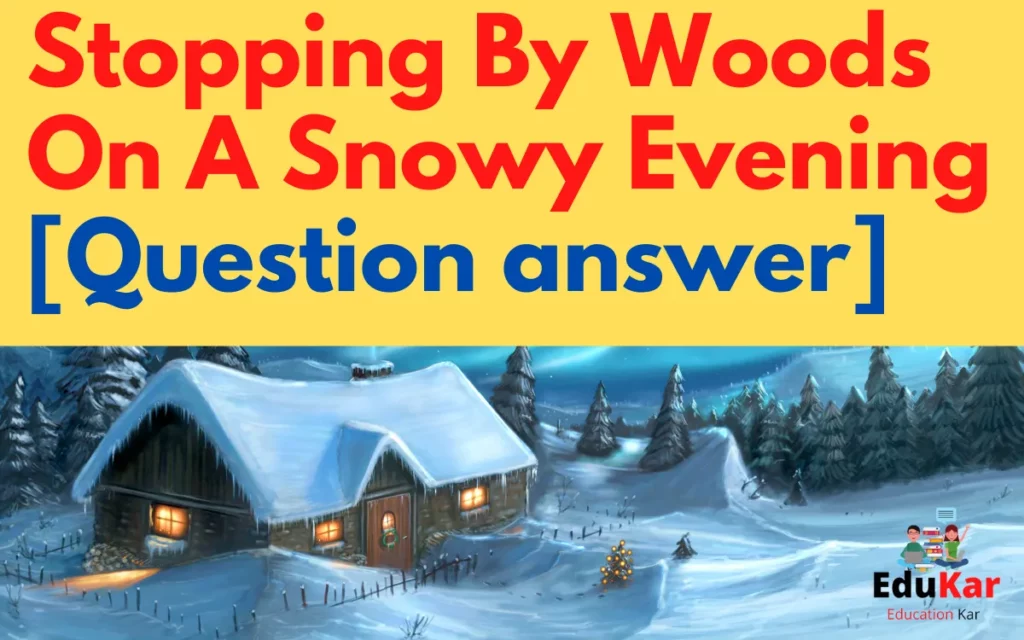| Name | Stopping By Woods On A Snowy Evening |
| Type | Poem |
| Author | Robert Frost |

Stopping By Woods On A Snowy Evening Summary
“Stopping by Woods on a Snowy Evening” is a famous poem written by Robert Frost, an American poet. The poem is a simple and elegant depiction of a man who stops to appreciate the beauty of a snowy forest on a quiet evening. The poem is filled with imagery and symbolism that explores the themes of nature, solitude, and responsibility.
The poem begins with the speaker describing the beauty of the woods and the snow, and how he has stopped his horse to take in the scene. He describes how the snow is “deep and crisp and even” and how the woods are “lovely, dark and deep.” The speaker expresses his desire to stay in the woods and enjoy the peaceful solitude, but he is aware that he has responsibilities that he must attend to.
The speaker then reflects on the fact that he has “promises to keep” and “miles to go before I sleep,” which serves as a reminder of the obligations he has to fulfill. The phrase “miles to go before I sleep” is often interpreted as a metaphor for the speaker’s responsibilities and the journey of life.
The poem concludes with the speaker reluctantly leaving the woods and the peaceful solitude, knowing that he must return to the world of responsibilities. The final lines of the poem, “And miles to go before I sleep, And miles to go before I sleep,” serve as a reminder of the journey of life and the responsibilities that one must fulfill.
Watch “Stopping By Woods On A Snowy Evening” Questions & Answers on Yotube
Stopping By Woods On A Snowy Evening Question answer
Answer the following questions:
Q1: How is “woods” different from “frost”?
Ans: Woods is different from Forest, because woods refers to an area of tress, smaller than a forest.
Q2: Where does the rider stop?
Ans: The rider stops by the woods.
Q3: Why does he stop?
Ans: He stops because he wants to enjoy the beauty of the woods fill up with snow.
Q4: “He will not see me stopping here”- what does this expression mean?
Ans: The expression “He will not see me stopping here” means the owner of the woods living in the village will not see the poet stopping by the woods.
Q5: Why does the horse give his harness bells a shake?
Ans: The horse gives his harness bell a shake to ask whether his master has stopped there by mistake.
Q6: What is “the only other sound” besides that of horness bells?
Ans: The only other sound is the sweep of easily flowing wind and falling snow.
Q7: Why does the poet use the expressions “dark”, “deep”, “darkest”?
Ans: The poet use the expressions “dark”, “deep”, “darkest” to express that he is fascinated by the natural beauty of the snow covering woods.
Q8: How do the speaker, the author of the woods and horse react to the beauties of nature?
Ans: The speaker is attracted by the beauty of nature but the horse thinks that safety is more important than the beauty and for the owner the woods is only a property.
Q9: What picture of natural beauty do you get from the poem?
Ans: The beauty we get from the poem is natural. It is a lonely snow covered forest in a dark evening. The sweep of the wind and the sound of the falling snow make the silence of the place more prominent.
Q10: In the final stanza, the speaker says that he is not yet ready to “sleep”. What does he to do before he can take rest?
Ans: The poet perform his routine duties and responsibilities before he can take rest.
Q11: What does the expression, “The darkest evening of the year”, suggest? Does it mean the “longest night of year” or “the most depressing state of his mind”? Give a reasoned answer.
Ans: The darkest night of the year suggests the most depressing state of mind because the speaker was very depressed due to his long journey.
Q12: Identify lines in the poem which show that the
a) horse was impatient.
Ans: He gives his harness bells a shake.
b) woods were silent
Ans: The only other sound’s the sweep.
Q13: What do you think the line “I have promises to keep” means?
Ans: This line means that the poet has many duties and obligation to fulfil.
Q14: What do you think the phrase “miles to go before sleep” means?
Ans: This lines means that the poet has a lot to accomplish in his life. He has no time for leisure.
Rewrite theses phrases and sentences by replacing the underlined words
Q1: I have promises to keep.
Ans: I have promises to fulfil.
Q2: And miles to go before I sleep.
Ans: And miles to go before I laze around.
Q3: To watch his woods fill up with snow.
Ans: To look at his woods collect with snow.
Q4: He will not see me stopping here.
Ans: He will not perceive me here.
Write these sentence in reported speech
Q1: The woods are lovely, dark, and deep,” the poet says.
Ans: The poet said that the woods are lovely, dark and deep.
Q2: “I have to go before I sleep”, said the traveller.
Ans: The traveller said that the he had miles to go before he slept.
Q3: The villager said, “I saw a man coming this way with his horse.”
Ans: The villager said that he saw a man coming that way with his horse.
Q4: “I was sleeping when you called,” Rahul told Reena?
Ans: Rahul told Reena that he was sleeing when she called.
Write these sentences in direct speech
Q1: Our teacher told us that Robert Frost is one of America’s most loved poets.
Ans: “Robert Frost is one of America’s mpst loved poets,” our teacher told us.
Q2: Rishabh told Veera that he wished to own a cottage in the woods.
Ans: Rishabh told Veera, ” I wish to own a cottage in the woods.”
Q3: We told Mrs. Chugh that the trek was very tiring, and that we would like to stop and rest.
Ans: “The trek is very tiring. We would like to stop and rest,” we told Mrs. Chugh.
Q4: Mother asked me if I could help her with her housework.
Ans: “Can you help me with the housework?” Mother asked me.




